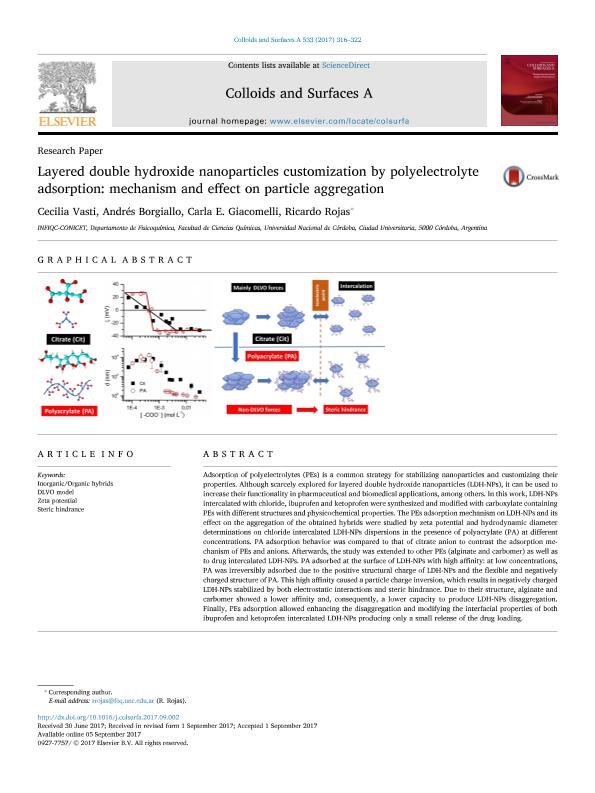Artículo
Layered double hydroxide nanoparticles customization by polyelectrolyte adsorption: mechanism and effect on particle aggregation
Fecha de publicación:
11/2017
Editorial:
Elsevier Science
Revista:
Colloids and Surfaces A: Physicochemical and Engineering Aspects
ISSN:
0927-7757
Idioma:
Inglés
Tipo de recurso:
Artículo publicado
Clasificación temática:
Resumen
Adsorption of polyelectrolytes (PEs) is a common strategy for stabilizing nanoparticles and customizing their properties. Although scarcely explored for layered double hydroxide nanoparticles (LDH-NPs), it can be used to increase their functionality in pharmaceutical and biomedical applications, among others. In this work, LDH-NPs intercalated with chloride, ibuprofen and ketoprofen were synthesized and modified with carboxylate containing PEs with different structures and physicochemical properties. The PEs adsorption mechanism on LDH-NPs and its effect on the aggregation of the obtained hybrids were studied by zeta potential and hydrodynamic diameter determinations on chloride intercalated LDH-NPs dispersions in the presence of polyacrylate (PA) at different concentrations. PA adsorption behavior was compared to that of citrate anion to contrast the adsorption mechanism of PEs and anions. Afterwards, the study was extended to other PEs (alginate and carbomer) as well as to drug intercalated LDH-NPs. PA adsorbed at the surface of LDH-NPs with high affinity: at low concentrations, PA was irreversibly adsorbed due to the positive structural charge of LDH-NPs and the flexible and negatively charged structure of PA. This high affinity caused a particle charge inversion, which results in negatively charged LDH-NPs stabilized by both electrostatic interactions and steric hindrance. Due to their structure, alginate and carbomer showed a lower affinity and, consequently, a lower capacity to produce LDH-NPs disaggregation. Finally, PEs adsorption allowed enhancing the disaggregation and modifying the interfacial properties of both ibuprofen and ketoprofen intercalated LDH-NPs producing only a small release of the drug loading.
Palabras clave:
Dlvo Model
,
Inorganic/Organic Hybrids
,
Steric Hindrance
,
Zeta Potential
Archivos asociados
Licencia
Identificadores
Colecciones
Articulos(INFIQC)
Articulos de INST.DE INVESTIGACIONES EN FISICO- QUIMICA DE CORDOBA
Articulos de INST.DE INVESTIGACIONES EN FISICO- QUIMICA DE CORDOBA
Citación
Vasti, Cecilia; Borgiallo, Andres; Giacomelli, Carla Eugenia; Rojas Delgado, Ricardo; Layered double hydroxide nanoparticles customization by polyelectrolyte adsorption: mechanism and effect on particle aggregation; Elsevier Science; Colloids and Surfaces A: Physicochemical and Engineering Aspects; 533; 11-2017; 316-322
Compartir
Altmétricas




